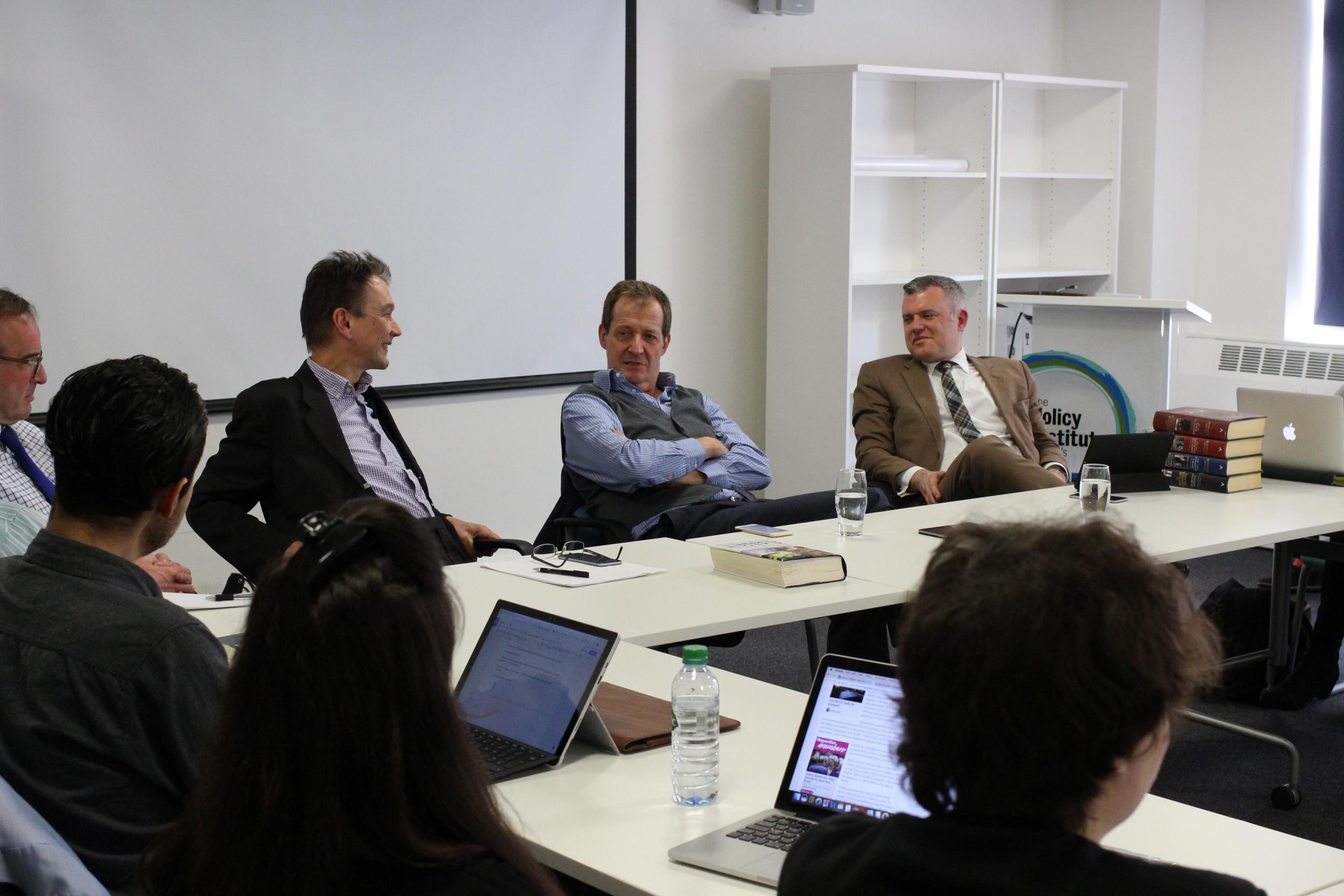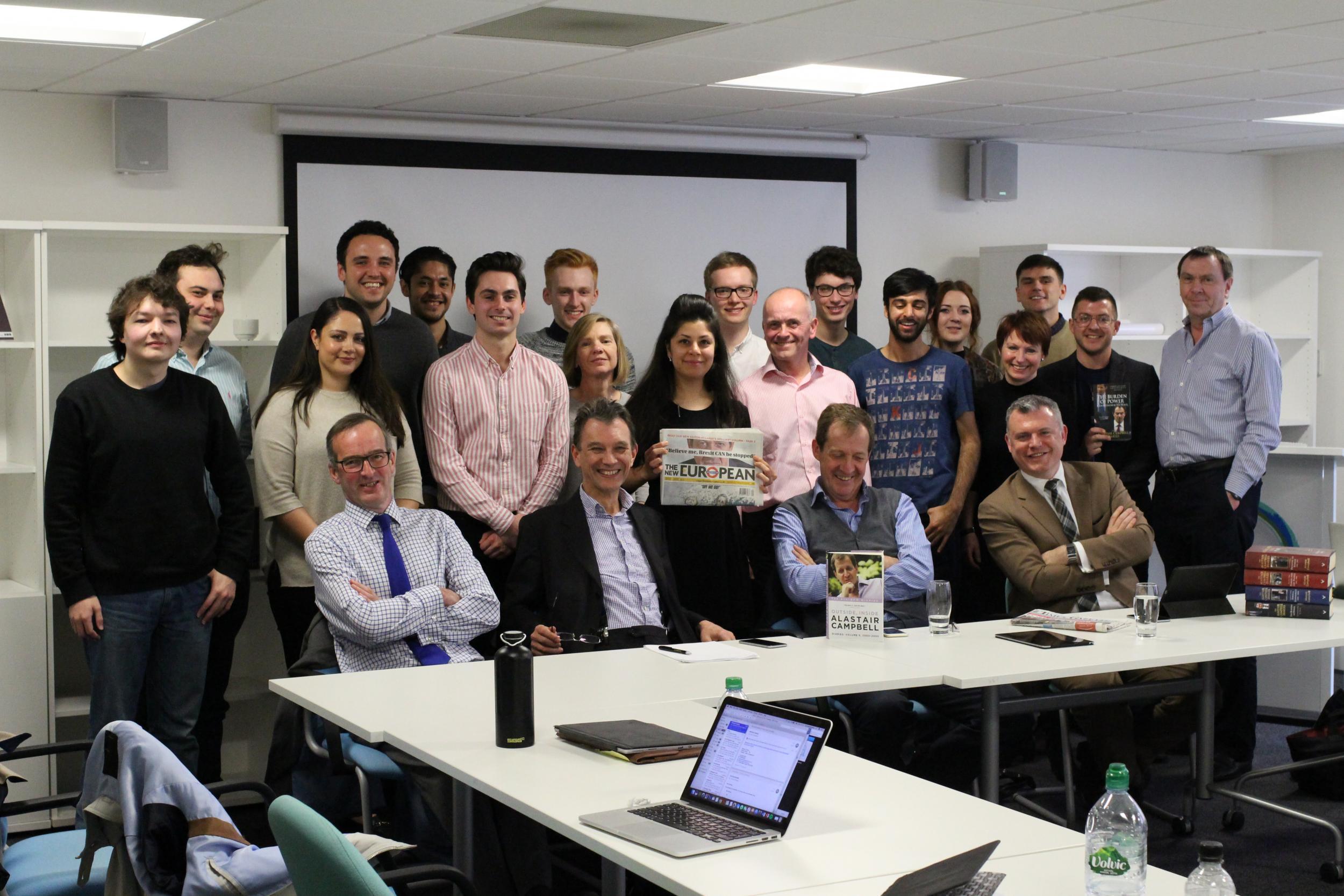Alastair Campbell: it is the myth not the reality of Tony Blair that fed both Corbynism and Brexit
The former Prime Minister's director of communications came to King's College, London, to talk to students about how the misrepresentations of New Labour have fed populism


Alastair Campbell came to the last session of this year’s “Blair Years” class that Jon Davis and I teach at King's College, London, yesterday. With all five volumes of his Diaries prominently displayed on the top table, he spoke about the importance of studying history to counter the mythologies of the recent past.
“Mythologies develop. They can have a grain of truth in them. A lot of mythologies have developed around New Labour and Tony Blair that are quite hard to dislodge, and a lot of that is because, and I hate to sound like Donald Trump, but we have amongst the most dishonest media in the world – not the broadcasters, but the broadcasters get intimidated by the most dishonest press in the world.
“I do defend what we did. I won’t concede that spin is our creation. I certainly won’t concede that we lied about Iraq, before any of you go there. I won’t concede that we had any option but to place ourselves in the centre of British politics – centre left, but centre – because in Britain only one Labour leader has won an election in the last 40 years.
“Abraham Lincoln is like a god, Churchill is like a god, Mandela is right up there, and then everyone else is all a little bit more mixed. Tony, when he left office, was the first prime minister to leave office to a standing ovation of the entire parliament, quite a rare thing, and his reputation has gone south since, but that doesn’t mean it cannot go back up again. In the end it’s not about reputation, it’s about what you do and what you achieve, but the reason this stuff is important is because at the moment the Labour Party has got itself into a position where Jeremy Corbyn feels he has to criticise New Labour to give himself definition.
“Now the Tories can’t do that with Thatcher. You saw this with Cameron, the Tories have to bow down before the Thatcher thing.
“That’s why history is so important and the Tories are much, much better at using it than we are. It is hugely to their benefit that Churchill is seen as the greatest prime minister ever. It is hugely to their benefit that whenever communism is talked about, Reagan and Thatcher are always locked together in the same sentence. And I used to have terrible arguments with Ed Miliband about this, because I went in to try to help him in the last election, but he didn’t want to defend Labour’s record because he wanted to be seen as his own man.
“This is why this history stuff is so important. I’m partly in the past, partly trying to shape the future. It’s not just a vanity thing to go round saying we were the most successful period ever in the history of the Labour Party in terms of winning elections. It’s about shaping politics now.”
Did he think, several of the students asked in different ways, that New Labour inadvertently shaped the politics of today’s Labour Party?
“There has to be something that we didn’t do right. I have said: Tony begat Gordon, begat Ed, begat Jeremy. There’s no doubt there’s a sort of continuum there. Gordon was pretty well qualified to be prime minister but he did try to move away from what Tony stood for on the public service reform stuff. Ed moved further and now Jeremy’s gone to a completely different place. But I still don’t quite know what we could have done differently, and it’s very hard to do it when you are full-on [in government].” One of Blair’s failures, however, was that “we didn’t develop talent”.
He was asked about the effect of Labour losing the 1992 election:
“I was expecting it in a way, just as I was in 2015. The public reached a view that Ed Miliband was never never going to be prime minister. I think it was the same with Neil [Kinnock]. But it [1992] had a visceral effect. We were utterly obsessed with winning. That is why I get so angry with Corbyn and the Labour Party now. What do they do all day?
“Discipline is important but you have to get the collection of personalities right. Tony: comfortable in his own skin, knows what he wants to achieve. Gordon: restless, waking up in the middle of the night with mad ideas, bangs them out on a typewriter, a lot of energy. Peter: thinking all the time, dreaming about politics, trying to shape things. And me as a workaholic words person. But all of us had this feeling that anything you could do to win, and anything you could to do to stop the others, you had to do it.
“Philip Gould and I used to have a weekly meeting – just me and him, sometimes we would bring in other people – with just one item on the agenda: if we were them, the Tories, knowing about us, what we know, what would we do with it? It was a way of analysing our team with the perspective of being an opponent. It’s amazing what happens if you think like that. Because people defend themselves all the time and they end up believing it.”
He contrasted New Labour’s approach with Corbyn’s. “Corbyn has got 28 staff and four vacancies. What do they do? I had an office a sixth the size of this with three people in it.
“They think they are getting attacked. I don’t think there was a coup. I think Hilary Benn just decided I can’t do this any more. This is ridiculous. It triggered this domino. I don’t think it was planned. I keep reading that there was this Blairite plot. I think if there was a Blairite plot I would have known about it. Then he wins again, but for the public you cannot have this situation.
“Like in 2010, deep down we didn’t think Gordon would win. Same with Ed. Now, nobody thinks we can win. Including him. And I’m not even convinced he wants to win. I don’t know if he’s enjoying it. I would be very surprised if he is.
“I’ve known Corbyn for all my adult life, I’ve always thought he’s the sort of diligent, rebellious, difficult backbench MP that every party needs, but he’s not a leader. Round and round we go. [Labour MPs] are saying we’ve just got to lose the election and then rebuild. But I think in today’s world it is possible that we could lose the election and then get wiped out. Look at Scotland.”
He was asked if Blair should have tried to be nicer to the Labour Party:
“Tony always had a very clear view and if you look at the Labour Party today he’s not wrong: if you allow the Labour Party to indulge itself, it doesn’t win.
“I think Tony’s unpopularity at the moment – Tony is basically a very nice bloke. A less nice bloke would have moved heaven and earth to stop Gordon. I went back to help Gordon, Peter went back to help Gordon, Tony helped Gordon. Once Gordon became Prime Minister, Tony vacated the field, partly to let Gordon get on with it. The consequence of that, I’m afraid, is that Tony has become defined by Iraq, making money, about which you only ever hear one side, you don’t hear what he does with it, like employ 200 people, like having operations in 23 different countries, doing pro bono, and then if you’re getting defined negatively constantly by the Mail and the Telegraph – you’d think Tony was still Prime Minister some days the way they go on about it – and of course he doesn’t have the infrastructure to fight back, nor does he have the inclination.”
He was asked about Labour supporters who felt that Blair had sold the party’s soul. “I don’t accept that,” he said. But people feel that Blair sold Labour’s soul, persisted one of the students.
“This is my problem with populism. Populism isn’t about the reality, it’s about how people feel and you have to challenge those feelings.”
Then he went from defending the New Labour record to trying to shape the politics of the future: his current campaign against Brexit, which he called, referring to Blair's recent speech, Operation Rise Up. “Brexit can be stopped,” he said. He was asked what he would have advised Corbyn and Keir Starmer, the shadow Brexit Secretary, to do.
“The referendum result has to be respected. What that could and should have meant: If I had been advising Labour I would have said its position should have been as follows. The Tories have the numbers. So it’s going to happen. Article 50 is the process that follows legitimately from the referendum. Our system is that you have a government and an opposition. And our position is that, as it’s happening, we are going to hold them to account every step of the way. That means it doesn’t matter whether we vote for or against, so we’ll vote against, just to remind them this was a close call. You might have had a few rebels on that – not many. Instead of which, we had MPs on all sides standing up and making speeches and saying this is a terrible course therefore I’m going to vote for it. Which just feeds people's cynicism.”
He mentioned Pat McFadden, a Labour MP for a strong Leave constituency: “That’s tough politics. But I believe, he believes, that if you had a leader and a campaign that was strong you could turn this around.

“There is a real feeling out there.” As well as arguing with Nigel Farage on breakfast TV that morning, Campbell had spoken at an anti-Brexit rally on Saturday afternoon, which attracted 80,000 people. “That’s not nothing. My rule on marches is for every person who turns up, 10 thought about it. That’s how I knew there was such opposition to the Iraq war. There were a million people on the march, that means 10m thought about it.”
We were grateful to Campbell for taking time out from bashing Farage in the morning and urging people to rip up the Daily Mail in the evening to come to our class, and didn’t mind that he used the class photo at the end (above) to promote his Diaries and The New European, the anti-Brexit newspaper for which he is Editor-at-Large.
Join our commenting forum
Join thought-provoking conversations, follow other Independent readers and see their replies
Comments
Bookmark popover
Removed from bookmarks